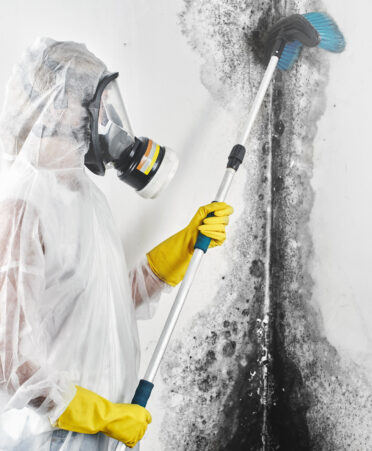(WACO, Texas) – Mold — that pesky, fungal nuisance — can be gotten rid of with vigilance and, if needed, professional help.
Tony Montoya, an instructor in Texas State Technical College’s Plumbing and Pipefitting Technology program, said one of the most common places to find mold is in the bathrooms of residences.
“Mold has to have moisture to grow,” he said.
Montoya recommends turning on the bathroom exhaust fan while bathing to remove excess moisture so that mold does not develop. And plumbing fixtures need to be properly insulated to prevent condensation.
TSTC’s Plumbing and Pipefitting Technology students take Plumbing Codes I in the first semester and Plumbing Codes II in the fifth semester in the associate degree program to learn how to properly install and maintain water, waste water, and gas systems.
A plumber should be called at the first sign of a leak, Montoya said.
Texas began regulating mold assessment and remediation work in 2005, said Blaine Furman, vice president of Specialty Restoration of Texas (SRT), which has its headquarters in Waco and offices in Arlington, Nolanville, Pflugerville and Tyler.
If people find mold, they need to contact a state-licensed mold assessor who will test the air, takehttps://www.specialtyrestorationoftexas.com/ swab samples, do a visual inspection, and then write a remediation plan. The plan has to be carried out by a state-licensed mold remediation contractor.
For companies to be licensed by Texas in mold remediation, they need to employ at least one person to be a licensed mold remediation contractor, Furman said. SRT has four licensed contractors on staff. The company also employs state-registered mold remediation technicians.
Furman said it is a challenge finding people who want to work with mold.
“Applicants lack the willingness to do the work because it is hot, sweaty, dirty work that is required,” he said. “Most of the work is done inside of a containment.”
Furman said applicants need to be nonsmokers, be physically fit and exhibit a willingness to work.
“They have to be skilled with their hands to cut out a wall or ceiling, and for it to be technically correct to show they did it,” he said.
Licensed plumbers, mold assessors, consultants and technicians, along with mold remediation companies, contractors and workers, can be checked for good standing with the state by researching the Texas Department of Licensing and Regulation’s website. The Better Business Bureau is also a source for checking the quality of businesses that deal with mold.
The International Code Council has designated mold prevention as one of its safety themes in May, which is Building Safety Month. Some of the tips that the ICC recommends include lowering indoor humidity, keeping HVAC drip pans clean and unobstructed, and venting moisture-generating appliances to the outside where possible.
Registration is underway for the fall semester at TSTC. For more information, go to tstc.edu.
